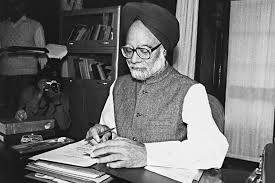(One of his associates once famously described him as India's over estimated economist and underestimated politician.)
"With profound grief, we inform the demise of Former Prime Minister of India, Dr. Manmohan Singh, aged 92. He was being treated for age-related medical conditions and had sudden loss of consciousness at home on 26th December 2024. Resuscitative measures were started immediately at home. He was brought to the Medical Emergency at AIIMS, New Delhi at 8:06 PM.
Despite all efforts, he could not be revived and was declared dead at 9:51 PM," AIIMS said in a statement, confirming the death.
He was the 'father' of India's 1991 economic reforms !!
Served two consecutive terms as UPA Prime Minister from 2004 to 2014
He was admitted to Delhi AIIMS earlier today after his health deteriorated
He had achievements and lapses too like all leaders.
In 2008 he had rather infamously said “to err is human” when Union Minority Affairs Minister A R Antulay had said that deaths of Mumbai top cops in 26/11 was due to “Terrorism plus factor”?
(The story of Dr Singh's dramatic fall from grace in his second term in office as PM and the slow but steady tarnishing of his reputation has played out in parallel with his country's decline on his watch. (UPA-2)
As India's economy has slowed (2012-13) and as its reputation for rampant corruption has reasserted itself, the idea that the country was on an inexorable road to becoming a global power has increasingly come into question.
In 1991, as India faced a severe economic crisis, the newly elected prime minister, P. V. Narasimha Rao, inducted the apolitical Singh into his cabinet as finance minister. Over the next few years, despite strong opposition, he carried out several structural reforms that liberalised India's economy.
Born in Gah, West Punjab, in what is today Pakistan, Singh's family migrated to India during its partition in 1947.
After obtaining his doctorate in economics from Oxford, Singh worked for the United Nations during 1966–1969. He subsequently began his bureaucratic career when Lalit Narayan Mishra hired him as an advisor in the Ministry of Commerce and Industry.
During the 1970s and 1980s, Singh held several key posts in the Government of India, such as Chief Economic Advisor (1972–1976), governor of the Reserve Bank (1982–1985) and head of the Planning Commission (1985–1987).
He holds the record of being India's only Minority community (Sikh) Prime Minister. In
In 2004, when the Congress-led United Progressive Alliance came to power, its chairperson Sonia Gandhi unexpectedly nominated Dr Singh as the Prime Minister.
His first ministry executed several key legislations and projects, including the National Rural Health Mission, Unique Identification Authority, Rural Employment Guarantee scheme and Right to Information Act
In 2008, opposition to a historic civil nuclear agreement with the United States nearly caused Singh's government to fall after Left Front parties withdrew their support. India's economy grew rapidly during his term.
The 2009 general election saw the UPA return with an increased mandate, with Singh retaining the office of prime minister.
Over the next few years, Singh's second ministry government faced a number of corruption charges over the organisation of the 2010 Commonwealth Games, the 2G spectrum allocation case and the allocation of coal blocks.
Dr Singh was never a member of the Lok Sabha but served as a member of the Rajya Sabha, Representing the state of Assam from 1991 to 2019 and Rajasthan from 2019 to 2024.
During corruption charges against his government, he had also rather infamously blamed - "coalition politics" for the same.
In a 2005 interview with the British journalist Mark Tully, Singh said about his Cambridge days:
"I first became conscious of the creative role of politics in shaping human affairs, and I owe that mostly to my teachers Joan Robinson and Nicholas Kaldor. Joan Robinson was a brilliant teacher, but she also sought to awaken the inner conscience of her students in a manner that very few others were able to achieve. She questioned me a great deal and made me think the unthinkable.
She propounded the left wing interpretation of Keynes, maintaining that the state has to play more of a role if you really want to combine development with social equity. Kaldor influenced me even more; I found him pragmatic, scintillating, stimulating. Joan Robinson was a great admirer of what was going on in China, but Kaldor used the Keynesian analysis to demonstrate that capitalism could be made to work.
One 'The Guardian' report in 2014 said:
In 'The Accidental Prime Minister', Sanjaya Baru, a former newspaper editor who served as Singh's spin doctor from 2004 to 2008, writes that the PM was "defanged" in his second term starting in 2004, deferring on cabinet appointments and major policy decisions to Sonia Gandhi, president of the Congress party which leads Singh's coalition government.
If true, the allegations would shed fresh light on an administration that has appeared asleep at the wheel while India's growth rate plummeted and the country was racked by a string of multibillion-pound corruption scandals concerning, among others, the 2010 Commonwealth Games, the allocation of 2G telecoms licences and undervalued coal mining rights sold off by the government which purportedly cost the public purse more than £156bn in lost revenue.
ends








No comments:
Post a Comment